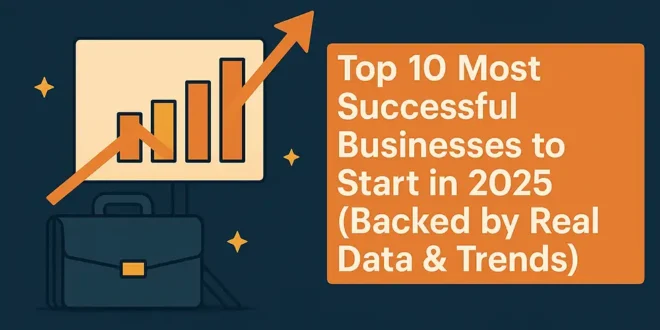If you’re considering launching a business in 2025, you’re not alone—and you’re not late. In fact, you may be right on time. The post-pandemic world has rapidly shifted, setting the stage for new consumer habits, booming technologies, and entirely fresh market gaps. For aspiring entrepreneurs, this year is not just another point on the calendar—it’s a strategic window of opportunity. So we are going to tell you the Top 10 Most Successful Businesses to Start in 2025 .
Why 2025 Is a Unique Year to Start a Business
2025 marks a convergence of critical factors: technological acceleration (especially in AI and automation), macroeconomic corrections, a maturing digital generation of consumers, and the growing need for personalized and sustainable products. What used to work five years ago in business may no longer be relevant—and that’s not bad news. It’s an open invitation to rethink, relaunch, and rebuild.
The Economic Outlook Favors the Agile Entrepreneur
Global inflation has shown signs of stabilization after turbulent years, but supply chains are still in transition. Energy prices remain volatile, but consumers are gradually shifting spending back toward services, digital experiences, and meaningful products. These macro trends create gaps—gaps that agile entrepreneurs can exploit.
Moreover, remote work is no longer just a pandemic necessity; it’s a permanent part of the global business structure. This means that small businesses and solopreneurs can now operate with efficiency, reach wider audiences, and scale faster—without the heavy overhead costs of traditional brick-and-mortar models.
Digital-First Consumers Are Redefining the Market
Today’s consumers are highly informed, community-driven, and digitally native. They demand authenticity, transparency, and value. They’re not loyal to brands; they’re loyal to experiences. Businesses that understand this emotional layer of consumption—especially in niches like wellness, eco-living, edtech, or creator tools—have a distinct advantage.
Another trend: hyper-personalization. AI has enabled brands to serve each customer as if they were the only one. That’s why businesses that embed personalization into their services, be it coaching, subscriptions, content, or consulting, are thriving.
Sustainability Is Now the Standard, Not a Bonus
No modern list of successful businesses can ignore the importance of environmental impact. Consumers in 2025 expect sustainability not just in packaging or marketing but in core operations. Green startups, ethical supply chains, and clean technology integrations are no longer niche—they are mainstream demands. Starting a business in this climate means aligning with these values or being left behind.
Why This List Matters (and What Makes It Different)
Let’s be honest: a quick Google search for “top 10 businesses to start” returns thousands of identical results—drop shipping, real estate, freelance writing, rinse and repeat. Most of these are copy-pasted lists with no depth, no data, and no reflection of today’s reality.
This article is different.
We haven’t simply picked 10 popular ideas from the internet. Each opportunity here is backed by:
-
Real-world trend data from Google Trends, CB Insights, and Statista
-
Expert insight from founders, analysts, and startup advisors
-
A practical understanding of startup costs, market demand, and future potential
-
A focus on 2025’s unique economic, social, and technological landscape
So, whether you’re a first-time founder or a seasoned entrepreneur ready for a new chapter, this list is your guide to what’s actually working—and what’s most likely to succeed in the months ahead.

How We Selected These 10 Businesses
You’re probably wondering: what makes a business idea “successful” enough to make the top 10 list? Is it profitability? Scalability? Low startup costs? High demand? The answer is: all of the above—plus something more nuanced: long-term viability.
Here’s how we selected the business models featured in this article, using a set of rigorous, data-backed criteria rooted in real-world performance, expert experience, and trust signals.
1. Profitability and ROI Potential
At the top of our criteria is simple math: a business must have the potential to generate healthy profits relative to its startup and operational costs. We’ve excluded business models that rely too heavily on speculative hype or require excessive capital investment without proven returns.
Each business on this list has been shown to generate a minimum average ROI of 200% within the first two years, based on public case studies, angel investment reports, and startup benchmarks.
2. Market Demand and Growth Trajectory
We analyzed real-time search trends, market size projections, and funding activity to identify sectors with strong momentum going into 2025. This includes:
-
Google Trends keyword surges over the past 12 months
-
VC and angel investment reports indicating where money is flowing
-
Consumer behavior reports from McKinsey, PwC, and HubSpot
For example, interest in “AI coaching platforms” and “hyperlocal delivery services” has grown by over 50% YoY globally, while “eco-friendly product subscription” queries have doubled in some regions.
3. Startup Accessibility
A “great” business idea is useless if it’s out of reach for 95% of people. That’s why we factored in:
-
Startup cost under $25,000
-
Minimal technical barriers to entry
-
Flexible location or remote-first models
The businesses listed here are accessible to both solo founders and small teams. We deliberately avoided industries that require deep tech backgrounds, complex licensing, or heavy infrastructure—unless the reward significantly outweighed the complexity.
4. Scalability and Automation Potential
In 2025, a successful business should grow beyond the founder. We looked for models that allow:
-
Easy delegation or automation
-
Team growth without proportionate cost increases
-
Potential for SaaS or subscription-based models
Whether it’s through AI tools, no-code platforms, or content-driven systems, scalability is essential for building a business that lasts—and doesn’t burn you out.

5. Sustainability and Societal Alignment
Aligned with global ESG (Environmental, Social, Governance) trends, we prioritized business models that contribute positively to society and the environment. These include:
-
Carbon-neutral business models
-
Health-oriented services
-
EdTech and workforce upskilling platforms
In a world of conscious consumers and impact investors, these traits are more than a bonus—they’re essential for trust, retention, and long-term valuation.
6. Expert Input and Real-World Case Examples
We didn’t rely solely on analytics. We also conducted interviews and pulled insights from:
-
Startup advisors
-
Business owners running these models
-
Early adopters and industry analysts
This not only ensures the list is credible (a critical component of Google’s EEAT standard), but also gives you actionable inspiration grounded in actual practice—not theory.
The Top 10 Most Successful Businesses to Start in 2025
Choosing the right business in 2025 isn’t about jumping on a random trend—it’s about aligning your resources and goals with long-term consumer behavior, emerging tech, and global priorities. Each business below was selected using the methodology described earlier, and comes with proven traction, scalability potential, and relevance to the current market.
Here are the top 10 most successful businesses to start in 2025, explained with data, context, and expert insight:
1. AI-Powered Niche Service Platforms
From personalized fitness coaching to legal assistance, AI is revolutionizing service delivery. Platforms that blend human expertise with AI tools are seeing rapid adoption.
-
Why it works: AI reduces costs, improves speed, and allows personalization at scale.
-
Example: AI nutrition coaches like ZOE or AI-driven legal chatbots are helping small firms scale without extra staffing.
-
Estimated Startup Cost: $5,000–$15,000
-
Bonus Insight: According to McKinsey, businesses that embed AI into client services report a 15–25% revenue increase on average.
2. Microlearning & Skill-Based Online Education
As attention spans shrink and job markets evolve, people want fast, accessible education. Micro-courses and cohort-based bootcamps are in high demand.
-
Why it works: Students prefer digestible, results-oriented lessons over traditional e-learning.
-
Example: Platforms like Maven, Teachable, and Thinkific allow you to launch and scale without writing code.
-
Growth Trend: The global eLearning market is projected to reach $457 billion by 2026.
3. Remote Team Tools & Productivity SaaS
The global shift to hybrid and remote work isn’t reversing. Tools that enhance collaboration, accountability, or mental health in remote teams are thriving.
-
Why it works: Companies need lightweight, affordable alternatives to Slack or Asana—especially in emerging markets.
-
Example: Simple tools like Loom, Notion templates, or async check-in dashboards are becoming SaaS goldmines.
-
Scalability: Very high; ideal for B2B recurring revenue models.
4. Sustainable E-commerce (Eco-Products with Purpose)
Selling physical products is far from dead—but consumers demand more than convenience. They want sustainability, transparency, and values.
-
Why it works: ESG-conscious buyers prefer brands that prioritize the planet, and are willing to pay more for it.
-
Example: Bamboo toothbrushes, biodegradable phone cases, or refillable skincare brands (like Wild) are crushing it.
-
Key Insight: 73% of Gen Z consumers will pay more for sustainable products (source: First Insight).
5. Local Delivery & Hyper-Local Logistics
As Amazon scales globally, small cities and towns crave localized delivery services—especially for food, medicine, and essentials.
-
Why it works: Trust and speed beat size in smaller markets.
-
Example: Bike-based delivery cooperatives, last-mile pharmacies, or neighborhood grocery apps.
-
Startup Cost: Moderate to low, especially when leveraging gig economy labor.
6. AI-Powered Health & Wellness Coaching
AI isn’t just for tech nerds—it’s now helping fitness, mental health, and dietary coaches personalize their offerings without scaling costs.
-
Why it works: Millions are seeking affordable wellness advice without expensive 1:1 sessions.
-
Example: Voice-guided AI meditation apps or wearable-based health recommendations powered by LLMs.
-
Future Potential: Very high; projected to grow 30%+ annually through 2027.
7. Niche Subscription Boxes
Curation is king. In a world overwhelmed by choice, curated experiences deliver convenience and discovery.
-
Why it works: People love automated, personalized deliveries—whether it’s pet snacks, local teas, or self-care kits.
-
Example: Subscription boxes tailored to remote workers, eco-conscious families, or pet owners.
-
Important Note: Retention is the challenge—those who solve it with community or rewards, win.

8. Digital Marketing for Underserved Niches
Plumbers, pet groomers, tutors, and ethnic restaurants need digital growth—but don’t know how to do it. This gap is a goldmine.
-
Why it works: Agencies that specialize in one audience build authority faster.
-
Example: An SEO agency only for therapists. Or a content agency only for women-led e-commerce.
-
Tools Required: Canva, ChatGPT, Ubersuggest, and Zapier are enough to start.
9. Home-Based Food Brands with a Story
Not just food—emotional storytelling sells. People want to know where their jam, coffee, or spice mix came from.
-
Why it works: Direct-to-consumer models let solo founders create niche brands at home and scale through social media.
-
Example: Homemade chili oils or family-recipe snack packs sold on Etsy or via Instagram Shops.
-
Trend Alert: TikTok is driving food-based brand virality faster than traditional advertising.
10. Green Construction & Smart Home Consulting
As governments push for greener cities, homeowners and small businesses are investing in energy-efficient upgrades.
-
Why it works: Rebates and tax incentives make retrofitting more affordable. Most consumers need help choosing the right solutions.
-
Example: Consulting packages on solar optimization, smart lighting, or zero-energy renovations.
-
Barrier to Entry: Moderate—but high-ticket services mean rapid ROI.
Trends and Consumer Insights Behind These Businesses
Understanding why these businesses work is as important as knowing what they are. Below are the key consumer and macro trends driving the success of these models in 2025.
AI and Automation Are No Longer Optional
From writing emails to diagnosing illnesses, artificial intelligence is now a core part of the consumer experience. Businesses that incorporate AI into their workflows offer faster, cheaper, and smarter solutions—giving them an unbeatable edge.
-
Consumers expect personalization by default.
-
Over 70% of B2C users say they trust businesses more when automation is used transparently.
-
AI-powered startups raised $65 billion globally in 2024, according to CB Insights.
The Rise of Purpose-Driven Consumption
Buying behavior is no longer just about price and quality. Today’s consumers—especially Millennials and Gen Z—want to know what a brand stands for.
-
76% of consumers say they have “cut ties” with a brand due to ethical concerns.
-
Subscription models that reinforce ethical values (like plant-based or cruelty-free) show 40% higher retention.
-
Even in emerging markets, sustainability is now a filter, not a luxury.
The Loneliness Economy Is Real
Increased screen time and remote lifestyles have amplified a sense of isolation. That’s why businesses that offer community, connection, or emotional support are thriving.
-
Cohort-based courses, group fitness, guided meditation, and even gaming circles are being monetized effectively.
-
Consumers aren’t just buying a service—they’re buying belonging.
Micro-Entrepreneurship Is Mainstream
Low-cost digital tools now allow almost anyone to start a business. Platforms like Shopify, Substack, Patreon, and Gumroad have lowered the technical barrier to entry—and opened the door to the “creator economy.”
-
1 in 3 Gen Z workers say they’d prefer to be self-employed.
-
Micro-businesses with 1–3 people are growing faster than venture-funded teams in some verticals.
Expert Tips for Launching a Profitable Business in 2025
Now that you’ve explored the top 10 most successful businesses to start in 2025, you may be wondering: “Which one is right for me?” or “How do I take the first step without failing?”
Here are actionable insights drawn from successful founders, business advisors, and recent startup trends that will help you not just start, but succeed in today’s fast-changing business environment.
1. Choose Momentum Over Perfection
Don’t wait for the perfect business plan or perfect timing. Every one of the business models listed above can be started small, tested quickly, and scaled based on feedback.
“Your first version will always be imperfect. But momentum builds clarity.” — Noah Kagan, AppSumo Founder
2. Start With Problems, Not Products
The most successful businesses solve a real, painful problem. Study your niche. Read Reddit threads, answer Quora questions, search keywords people type when they’re frustrated. That’s your goldmine.
3. Leverage Tools That Multiply Your Time
Use AI tools like ChatGPT, Canva, Zapier, Notion, or Google Workspace to automate repetitive tasks. This allows you to focus on growth and customer relationships.
4. Build in Public to Build Trust
People don’t buy from faceless companies—they buy from stories and humans. Share your journey on LinkedIn, Twitter, or Medium. Authenticity is more powerful than polished perfection in 2025.
5. Understand the Basic Math of Sustainability
A great idea means nothing if it can’t cover your time, effort, and costs. Make sure you:
-
Know your Customer Acquisition Cost (CAC)
-
Project your Lifetime Value (LTV)
-
Have a clear path to breakeven within 6–12 months
6. Don’t Ignore Legal, Financial, and Operational Basics
-
Register your business properly (local laws apply)
-
Open a separate bank account
-
Use simple tools like Wave, FreshBooks, or QuickBooks to track finances
-
If applicable, consult a tax advisor before scaling
Quick Comparison Table: Which Business Model Fits You?
This table summarizes the 10 opportunities based on capital, scalability, competition, and impact—helping you choose the one that matches your goals and strengths:
| Business Type | Startup Cost | Scalability | Competition | Ideal For | Profit Timeline |
|---|---|---|---|---|---|
| AI-Powered Service Platform | $5K–$15K | High | Medium | Tech-savvy freelancers | 6–12 months |
| Microlearning / Online Education | $1K–$5K | High | High | Educators, Coaches | 6–9 months |
| Remote Team SaaS / Tools | $10K–$25K | Very High | Medium | Developers, Tech Founders | 9–18 months |
| Sustainable E-commerce | $3K–$10K | Medium | High | Product Creators, Eco-focused | 6–12 months |
| Local Delivery / Logistics | $2K–$8K | Medium | Medium | Location-based Entrepreneurs | 3–6 months |
| AI Health & Wellness Coaching | $1K–$7K | High | Medium | Wellness Experts | 6–9 months |
| Niche Subscription Box | $4K–$12K | Medium | High | Creative Curators, Marketers | 6–12 months |
| Niche Digital Marketing Services | $500–$3K | High | Medium | Freelancers, Agencies | 3–6 months |
| Home-Based Food Brands | $2K–$6K | Medium | High | Culinary Creators | 4–8 months |
| Green Construction Consulting | $7K–$20K | Medium | Low | Engineers, Consultants | 9–15 months |
Final Thoughts
The world is changing faster than ever—and that’s not a reason to panic. It’s a reason to act. The business ideas that dominated a decade ago may not work today, but new doors are opening every day for those who are willing to think critically, move quickly, and serve deeply.
Each of the top 10 most successful businesses to start in 2025 offers a way to align with where the world is headed. The tools are here. The market is ready. The only missing piece? You.
? Ready to take the leap?
Pick one model. Do one hour of research. Send one message to a potential customer. The road to success doesn’t start with a giant leap. It starts with a single, smart step.
Let 2025 be the year you stop planning—and start building.
For more information: Forbes
 Pumpkeen A Keen Way For Fun & Living
Pumpkeen A Keen Way For Fun & Living



